Sociology Assignment: Analyzing Abraham Lincoln's Personality Traits
VerifiedAdded on 2022/10/01
|7
|1114
|339
Essay
AI Summary
This essay provides a sociological analysis of Abraham Lincoln's personality, focusing on his social interest as a key driver of his leadership. It explores Lincoln's actions during the American Civil War, highlighting his concern for citizens and his empathetic approach. The essay applies Alfred Adler...

Running head: SOCIOLOGY
Personality analysis of Abraham Lincoln
Name of the student:
Name of the university:
Author note:
Personality analysis of Abraham Lincoln
Name of the student:
Name of the university:
Author note:
Paraphrase This Document
Need a fresh take? Get an instant paraphrase of this document with our AI Paraphraser
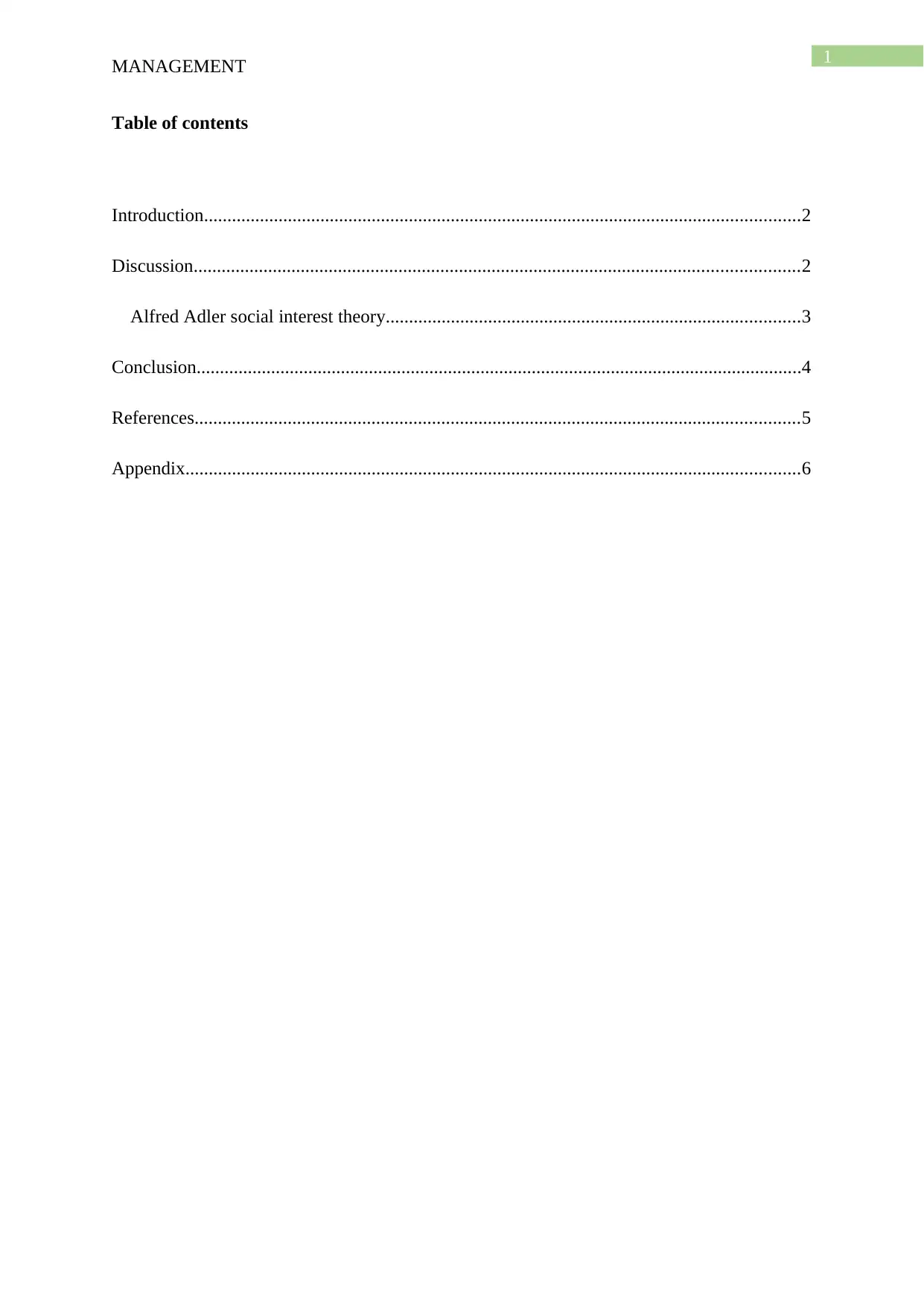
1
MANAGEMENT
Table of contents
Introduction................................................................................................................................2
Discussion..................................................................................................................................2
Alfred Adler social interest theory.........................................................................................3
Conclusion..................................................................................................................................4
References..................................................................................................................................5
Appendix....................................................................................................................................6
MANAGEMENT
Table of contents
Introduction................................................................................................................................2
Discussion..................................................................................................................................2
Alfred Adler social interest theory.........................................................................................3
Conclusion..................................................................................................................................4
References..................................................................................................................................5
Appendix....................................................................................................................................6
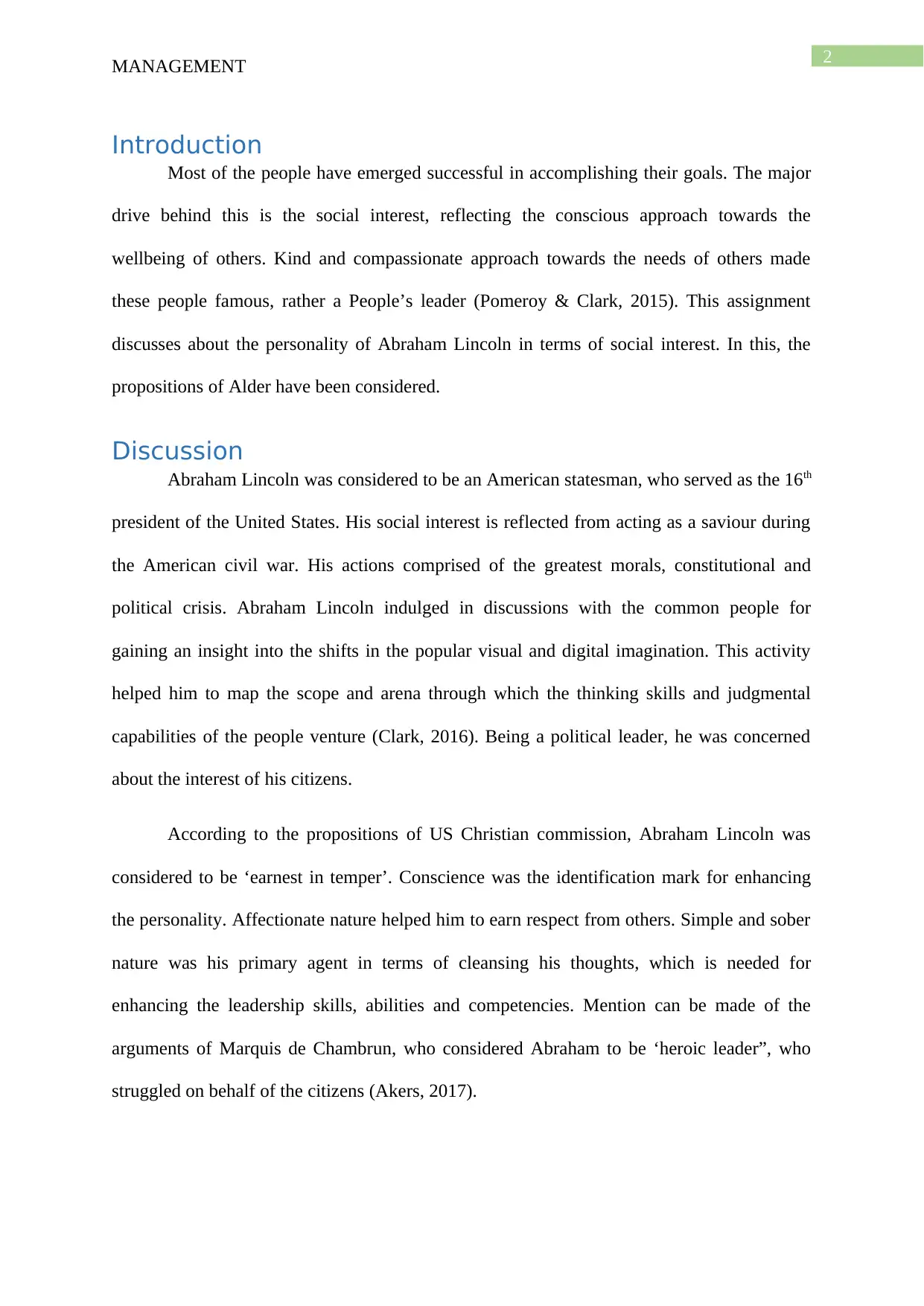
2
MANAGEMENT
Introduction
Most of the people have emerged successful in accomplishing their goals. The major
drive behind this is the social interest, reflecting the conscious approach towards the
wellbeing of others. Kind and compassionate approach towards the needs of others made
these people famous, rather a People’s leader (Pomeroy & Clark, 2015). This assignment
discusses about the personality of Abraham Lincoln in terms of social interest. In this, the
propositions of Alder have been considered.
Discussion
Abraham Lincoln was considered to be an American statesman, who served as the 16th
president of the United States. His social interest is reflected from acting as a saviour during
the American civil war. His actions comprised of the greatest morals, constitutional and
political crisis. Abraham Lincoln indulged in discussions with the common people for
gaining an insight into the shifts in the popular visual and digital imagination. This activity
helped him to map the scope and arena through which the thinking skills and judgmental
capabilities of the people venture (Clark, 2016). Being a political leader, he was concerned
about the interest of his citizens.
According to the propositions of US Christian commission, Abraham Lincoln was
considered to be ‘earnest in temper’. Conscience was the identification mark for enhancing
the personality. Affectionate nature helped him to earn respect from others. Simple and sober
nature was his primary agent in terms of cleansing his thoughts, which is needed for
enhancing the leadership skills, abilities and competencies. Mention can be made of the
arguments of Marquis de Chambrun, who considered Abraham to be ‘heroic leader”, who
struggled on behalf of the citizens (Akers, 2017).
MANAGEMENT
Introduction
Most of the people have emerged successful in accomplishing their goals. The major
drive behind this is the social interest, reflecting the conscious approach towards the
wellbeing of others. Kind and compassionate approach towards the needs of others made
these people famous, rather a People’s leader (Pomeroy & Clark, 2015). This assignment
discusses about the personality of Abraham Lincoln in terms of social interest. In this, the
propositions of Alder have been considered.
Discussion
Abraham Lincoln was considered to be an American statesman, who served as the 16th
president of the United States. His social interest is reflected from acting as a saviour during
the American civil war. His actions comprised of the greatest morals, constitutional and
political crisis. Abraham Lincoln indulged in discussions with the common people for
gaining an insight into the shifts in the popular visual and digital imagination. This activity
helped him to map the scope and arena through which the thinking skills and judgmental
capabilities of the people venture (Clark, 2016). Being a political leader, he was concerned
about the interest of his citizens.
According to the propositions of US Christian commission, Abraham Lincoln was
considered to be ‘earnest in temper’. Conscience was the identification mark for enhancing
the personality. Affectionate nature helped him to earn respect from others. Simple and sober
nature was his primary agent in terms of cleansing his thoughts, which is needed for
enhancing the leadership skills, abilities and competencies. Mention can be made of the
arguments of Marquis de Chambrun, who considered Abraham to be ‘heroic leader”, who
struggled on behalf of the citizens (Akers, 2017).
⊘ This is a preview!⊘
Do you want full access?
Subscribe today to unlock all pages.

Trusted by 1+ million students worldwide
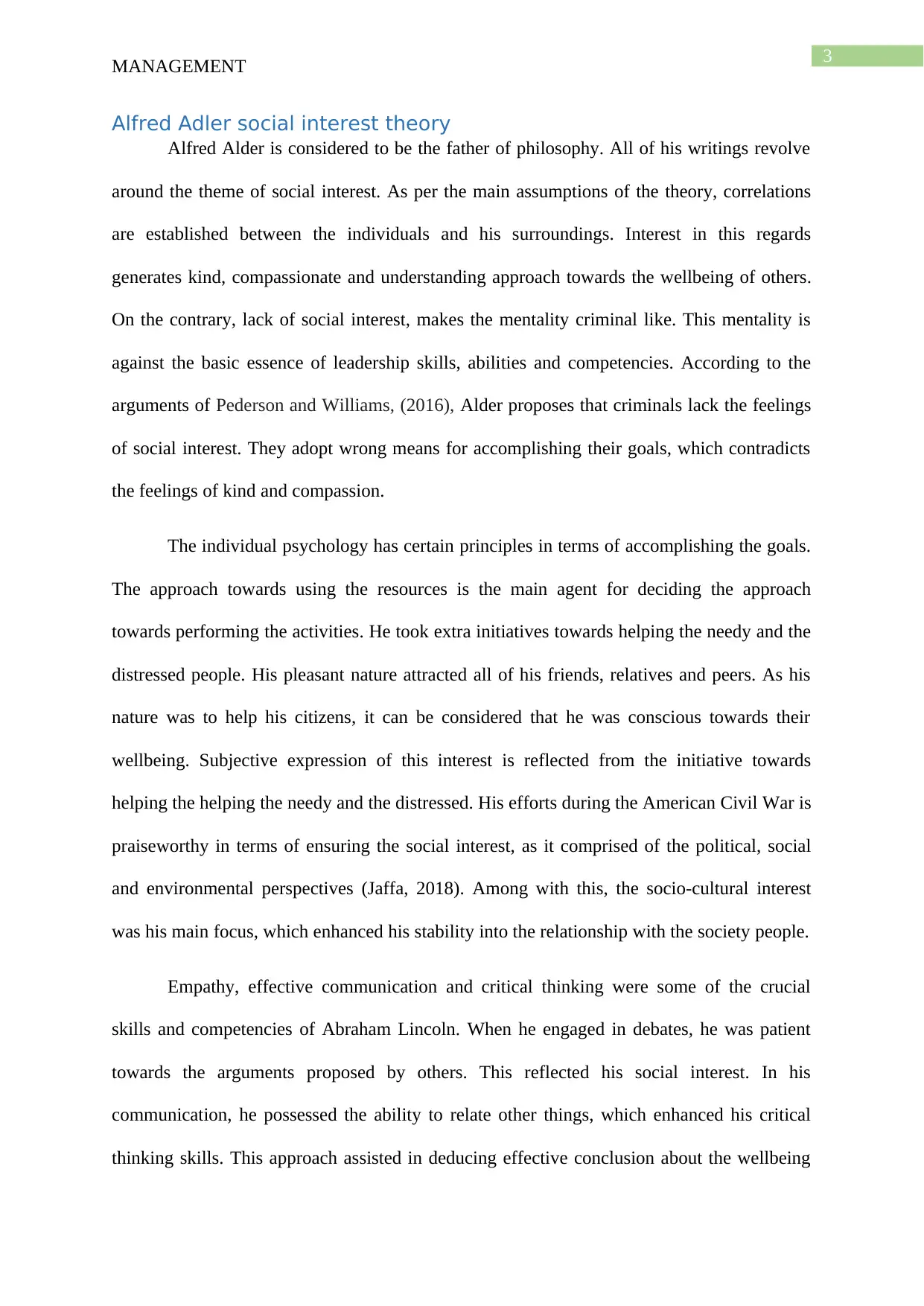
3
MANAGEMENT
Alfred Adler social interest theory
Alfred Alder is considered to be the father of philosophy. All of his writings revolve
around the theme of social interest. As per the main assumptions of the theory, correlations
are established between the individuals and his surroundings. Interest in this regards
generates kind, compassionate and understanding approach towards the wellbeing of others.
On the contrary, lack of social interest, makes the mentality criminal like. This mentality is
against the basic essence of leadership skills, abilities and competencies. According to the
arguments of Pederson and Williams, (2016), Alder proposes that criminals lack the feelings
of social interest. They adopt wrong means for accomplishing their goals, which contradicts
the feelings of kind and compassion.
The individual psychology has certain principles in terms of accomplishing the goals.
The approach towards using the resources is the main agent for deciding the approach
towards performing the activities. He took extra initiatives towards helping the needy and the
distressed people. His pleasant nature attracted all of his friends, relatives and peers. As his
nature was to help his citizens, it can be considered that he was conscious towards their
wellbeing. Subjective expression of this interest is reflected from the initiative towards
helping the helping the needy and the distressed. His efforts during the American Civil War is
praiseworthy in terms of ensuring the social interest, as it comprised of the political, social
and environmental perspectives (Jaffa, 2018). Among with this, the socio-cultural interest
was his main focus, which enhanced his stability into the relationship with the society people.
Empathy, effective communication and critical thinking were some of the crucial
skills and competencies of Abraham Lincoln. When he engaged in debates, he was patient
towards the arguments proposed by others. This reflected his social interest. In his
communication, he possessed the ability to relate other things, which enhanced his critical
thinking skills. This approach assisted in deducing effective conclusion about the wellbeing
MANAGEMENT
Alfred Adler social interest theory
Alfred Alder is considered to be the father of philosophy. All of his writings revolve
around the theme of social interest. As per the main assumptions of the theory, correlations
are established between the individuals and his surroundings. Interest in this regards
generates kind, compassionate and understanding approach towards the wellbeing of others.
On the contrary, lack of social interest, makes the mentality criminal like. This mentality is
against the basic essence of leadership skills, abilities and competencies. According to the
arguments of Pederson and Williams, (2016), Alder proposes that criminals lack the feelings
of social interest. They adopt wrong means for accomplishing their goals, which contradicts
the feelings of kind and compassion.
The individual psychology has certain principles in terms of accomplishing the goals.
The approach towards using the resources is the main agent for deciding the approach
towards performing the activities. He took extra initiatives towards helping the needy and the
distressed people. His pleasant nature attracted all of his friends, relatives and peers. As his
nature was to help his citizens, it can be considered that he was conscious towards their
wellbeing. Subjective expression of this interest is reflected from the initiative towards
helping the helping the needy and the distressed. His efforts during the American Civil War is
praiseworthy in terms of ensuring the social interest, as it comprised of the political, social
and environmental perspectives (Jaffa, 2018). Among with this, the socio-cultural interest
was his main focus, which enhanced his stability into the relationship with the society people.
Empathy, effective communication and critical thinking were some of the crucial
skills and competencies of Abraham Lincoln. When he engaged in debates, he was patient
towards the arguments proposed by others. This reflected his social interest. In his
communication, he possessed the ability to relate other things, which enhanced his critical
thinking skills. This approach assisted in deducing effective conclusion about the wellbeing
Paraphrase This Document
Need a fresh take? Get an instant paraphrase of this document with our AI Paraphraser
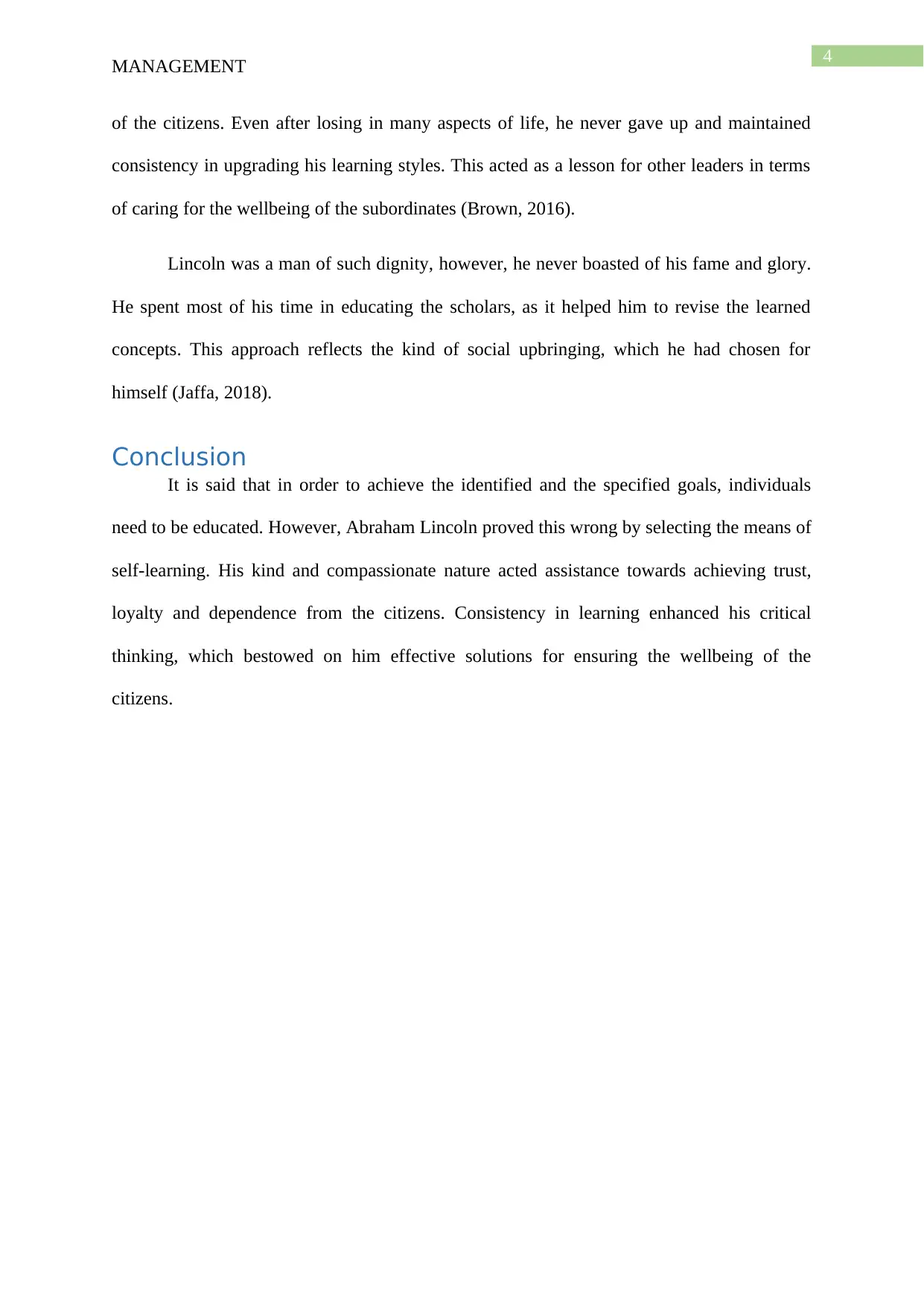
4
MANAGEMENT
of the citizens. Even after losing in many aspects of life, he never gave up and maintained
consistency in upgrading his learning styles. This acted as a lesson for other leaders in terms
of caring for the wellbeing of the subordinates (Brown, 2016).
Lincoln was a man of such dignity, however, he never boasted of his fame and glory.
He spent most of his time in educating the scholars, as it helped him to revise the learned
concepts. This approach reflects the kind of social upbringing, which he had chosen for
himself (Jaffa, 2018).
Conclusion
It is said that in order to achieve the identified and the specified goals, individuals
need to be educated. However, Abraham Lincoln proved this wrong by selecting the means of
self-learning. His kind and compassionate nature acted assistance towards achieving trust,
loyalty and dependence from the citizens. Consistency in learning enhanced his critical
thinking, which bestowed on him effective solutions for ensuring the wellbeing of the
citizens.
MANAGEMENT
of the citizens. Even after losing in many aspects of life, he never gave up and maintained
consistency in upgrading his learning styles. This acted as a lesson for other leaders in terms
of caring for the wellbeing of the subordinates (Brown, 2016).
Lincoln was a man of such dignity, however, he never boasted of his fame and glory.
He spent most of his time in educating the scholars, as it helped him to revise the learned
concepts. This approach reflects the kind of social upbringing, which he had chosen for
himself (Jaffa, 2018).
Conclusion
It is said that in order to achieve the identified and the specified goals, individuals
need to be educated. However, Abraham Lincoln proved this wrong by selecting the means of
self-learning. His kind and compassionate nature acted assistance towards achieving trust,
loyalty and dependence from the citizens. Consistency in learning enhanced his critical
thinking, which bestowed on him effective solutions for ensuring the wellbeing of the
citizens.
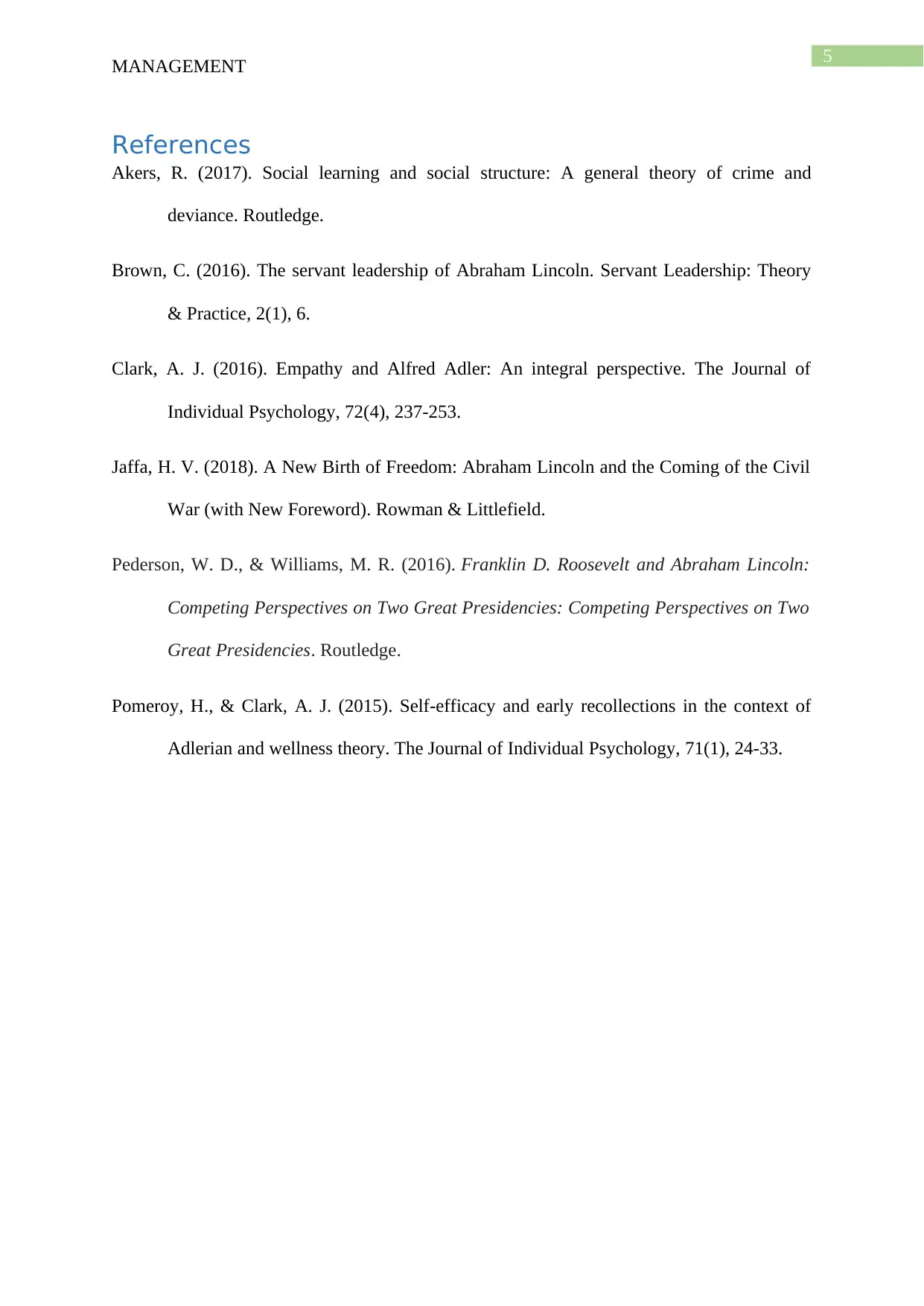
5
MANAGEMENT
References
Akers, R. (2017). Social learning and social structure: A general theory of crime and
deviance. Routledge.
Brown, C. (2016). The servant leadership of Abraham Lincoln. Servant Leadership: Theory
& Practice, 2(1), 6.
Clark, A. J. (2016). Empathy and Alfred Adler: An integral perspective. The Journal of
Individual Psychology, 72(4), 237-253.
Jaffa, H. V. (2018). A New Birth of Freedom: Abraham Lincoln and the Coming of the Civil
War (with New Foreword). Rowman & Littlefield.
Pederson, W. D., & Williams, M. R. (2016). Franklin D. Roosevelt and Abraham Lincoln:
Competing Perspectives on Two Great Presidencies: Competing Perspectives on Two
Great Presidencies. Routledge.
Pomeroy, H., & Clark, A. J. (2015). Self-efficacy and early recollections in the context of
Adlerian and wellness theory. The Journal of Individual Psychology, 71(1), 24-33.
MANAGEMENT
References
Akers, R. (2017). Social learning and social structure: A general theory of crime and
deviance. Routledge.
Brown, C. (2016). The servant leadership of Abraham Lincoln. Servant Leadership: Theory
& Practice, 2(1), 6.
Clark, A. J. (2016). Empathy and Alfred Adler: An integral perspective. The Journal of
Individual Psychology, 72(4), 237-253.
Jaffa, H. V. (2018). A New Birth of Freedom: Abraham Lincoln and the Coming of the Civil
War (with New Foreword). Rowman & Littlefield.
Pederson, W. D., & Williams, M. R. (2016). Franklin D. Roosevelt and Abraham Lincoln:
Competing Perspectives on Two Great Presidencies: Competing Perspectives on Two
Great Presidencies. Routledge.
Pomeroy, H., & Clark, A. J. (2015). Self-efficacy and early recollections in the context of
Adlerian and wellness theory. The Journal of Individual Psychology, 71(1), 24-33.
⊘ This is a preview!⊘
Do you want full access?
Subscribe today to unlock all pages.

Trusted by 1+ million students worldwide
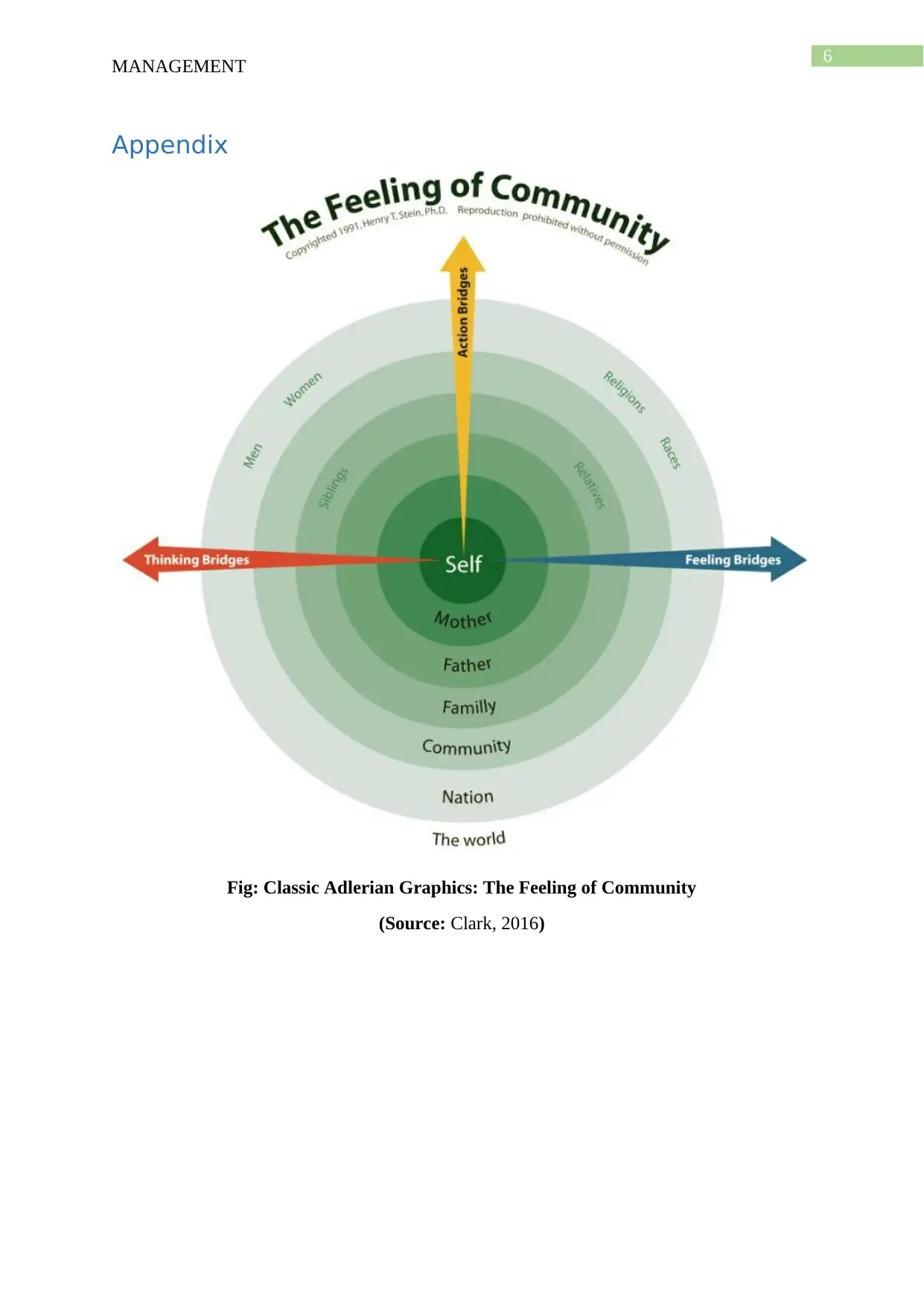
6
MANAGEMENT
Appendix
Fig: Classic Adlerian Graphics: The Feeling of Community
(Source: Clark, 2016)
MANAGEMENT
Appendix
Fig: Classic Adlerian Graphics: The Feeling of Community
(Source: Clark, 2016)
1 out of 7
Your All-in-One AI-Powered Toolkit for Academic Success.
+13062052269
info@desklib.com
Available 24*7 on WhatsApp / Email
![[object Object]](/_next/static/media/star-bottom.7253800d.svg)
Unlock your academic potential
© 2024 | Zucol Services PVT LTD | All rights reserved.